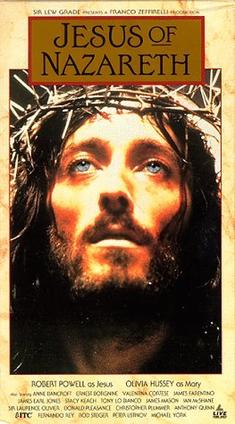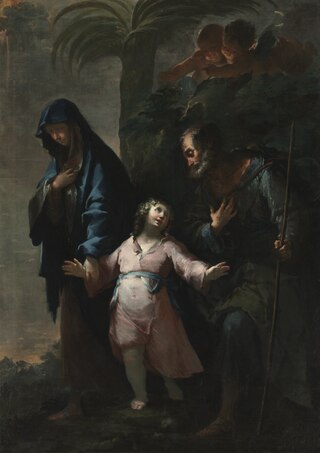
Nazareth is the largest city in the Northern District of Israel. In 2021 its population was 77,925. Known as "the Arab capital of Israel", Nazareth serves as a cultural, political, religious, economic and commercial center for the Arab citizens of Israel, and is also a center of Arab and Palestinian nationalism. The inhabitants are predominantly Arab citizens of Israel, of whom 69% are Muslim and 30.9% Christian. The city also commands immense religious significance, deriving from its status as the hometown of Jesus, the central figure of Christianity.

Nazareth is a borough in Northampton County, Pennsylvania, United States. The borough's population was 6,053 at the 2020 census. Nazareth is part of the Lehigh Valley metropolitan area, which had a population of 861,899 and was the 68th-most populous metropolitan area in the U.S. as of 2020.
The historicity of Jesus is the question of whether or not Jesus of Nazareth historically existed. The question of historicity was generally settled in scholarship in the early 20th century, and the idea that Jesus was a mythical figure has been and still is considered a fringe theory in academic scholarship for more than two centuries, but has gained popular attention in recent decades due to the growth of the internet.

The Life and Morals of Jesus of Nazareth, commonly referred to as the Jefferson Bible, is one of two religious works constructed by Thomas Jefferson. Jefferson compiled the manuscripts but never published them. The first, The Philosophy of Jesus of Nazareth, was completed in 1804, but no copies exist today. The second, The Life and Morals of Jesus of Nazareth, was completed in 1820 by cutting and pasting with a razor and glue numerous sections from the New Testament as extractions of the doctrine of Jesus. Jefferson's condensed composition excludes all miracles by Jesus and most mentions of the supernatural, including sections of the four gospels that contain the Resurrection and most other miracles, and passages that portray Jesus as divine.

Jesus of Nazareth is a 1977 British-Italian epic film and television drama serial directed by Franco Zeffirelli and co-written by Zeffirelli, Anthony Burgess and Suso Cecchi d'Amico, which dramatizes the birth, life, ministry, crucifixion and resurrection of Jesus. It stars Robert Powell as Jesus, and features an all-star ensemble cast of renowned actors, including eight who had won or would go on to win Academy Awards: Anne Bancroft, Ernest Borgnine, Laurence Olivier, Christopher Plummer, Anthony Quinn, Rod Steiger, James Earl Jones and Peter Ustinov.

Matthew 2:23 is the twenty-third verse of the second chapter of the Gospel of Matthew in the New Testament. The young Jesus and the Holy Family have just returned from Egypt and in this verse are said to settle in Nazareth. This is the final verse of Matthew's infancy narrative.

Matthew 4:13 is the thirteenth verse of the fourth chapter of the Gospel of Matthew in the New Testament. In the previous verse, Jesus returned to Galilee after hearing of the arrest of John the Baptist. In this verse, he leaves from Nazareth to Capernaum.

The flight into Egypt is a story recounted in the Gospel of Matthew and in New Testament apocrypha. Soon after the visit by the Magi, an angel appeared to Joseph in a dream telling him to flee to Egypt with Mary and the infant Jesus since King Herod would seek the child to kill him. The episode is frequently shown in art, as the final episode of the Nativity of Jesus in art, and was a common component in cycles of the Life of the Virgin as well as the Life of Christ. Within the narrative tradition, iconic representation of the "Rest on the Flight into Egypt" developed after the 14th century.

Matthew 13 is the thirteenth chapter in the Gospel of Matthew in the New Testament section of the Christian Bible. Verses 3 to 52 of this chapter form the third of the five Discourses of Matthew, called the Parabolic Discourse, based on the parables of the Kingdom. At the end of the chapter, Jesus is rejected by the people of his hometown, Nazareth.

The Church of the Annunciation, sometimes also referred to as the Basilica of the Annunciation, is a Catholic church in Nazareth, in northern Israel. It is one of two claimants to the site of the Annunciation – in which angel Gabriel appeared to the Virgin Mary and announced that she would give birth to Jesus – the other being the Greek Orthodox Church of the Annunciation.

The Census of Quirinius was a census of the Roman province of Judaea taken in 6 CE, upon its formation, by the governor of Roman Syria, Publius Sulpicius Quirinius. The census triggered a revolt of Jewish extremists led by Judas of Galilee.
Master Jesus is the theosophical concept of Jesus in theosophy and the Ascended Master Teachings.
Arthur Wallis (1922–1988) was an itinerant Bible teacher and author. Through his teaching and writing, most notably his book The Radical Christian (1981), Wallis gained the reputation of 'architect' of that expression of UK evangelicalism initially dubbed 'the house church movement', more recently labeled British New Church Movement.

The Jesus Dynasty is a 2006 book written by James Tabor in which he develops the hypothesis that the original Jesus movement was a dynastic one, with the intention of overthrowing the rule of Herod Antipas; that Jesus of Nazareth was a royal messiah, while his cousin John the Baptist planned to be a priestly messiah.

All four gospels report that Jesus visited Capernaum in Galilee and often attended the synagogue there:

An itinerant preacher is a Christian evangelist who preaches the basic Christian redemption message while traveling around to different groups of people within a relatively short period of time. The usage of these travelling ministers is known as itineracy or itinerancy.

The return of the family of Jesus to Nazareth, also known as the return from Egypt, appears in the reports of the early life of Jesus given in the canonical gospels. Both of the gospels which describe the nativity of Jesus agree that he was born in Bethlehem and then later moved with his family to live in Nazareth. The Gospel of Matthew describes how Joseph, Mary, and Jesus went to Egypt to escape from Herod the Great's slaughter of the baby boys in Bethlehem. Matthew does not mention Nazareth as being the previous home of Joseph and Mary; he says that Joseph was afraid to go to Judea because Herod Archelaus was ruling there and so the family went to Nazareth instead. The Gospel of Luke, on the other hand, does not record anything about the flight to Egypt, but says that Joseph had been previously living in Nazareth, and returned there after the Presentation of Jesus at the Temple.

Oral gospel traditions is the hypothetical first stage in the formation of the written gospels as information was passed by word of mouth. These oral traditions included different types of stories about Jesus. For example, people told anecdotes about Jesus healing the sick and debating with his opponents. The traditions also included sayings attributed to Jesus, such as parables and teachings on various subjects which, along with other sayings, formed the oral gospel tradition. The supposition of such traditions have been the focus of scholars such as Bart Ehrman, James Dunn, and Richard Bauckham, although each scholar varies widely in his conclusions, with Ehrman and Bauckham publicly debating on the subject.

Jesus of Nazareth: Holy Week is the second volume in Pope Benedict XVI's three-volume meditation on the life and teachings of Jesus Christ, offers a detailed analysis of Jesus Christ's final week in Jerusalem, examining the political, religious and scholarly aspects of Jesus' life, teaching, death and resurrection.
Nathanael, also known as Nathaniel of Cana was a disciple of Jesus, mentioned only in chapters 1 and 21 of the Gospel of John.
















